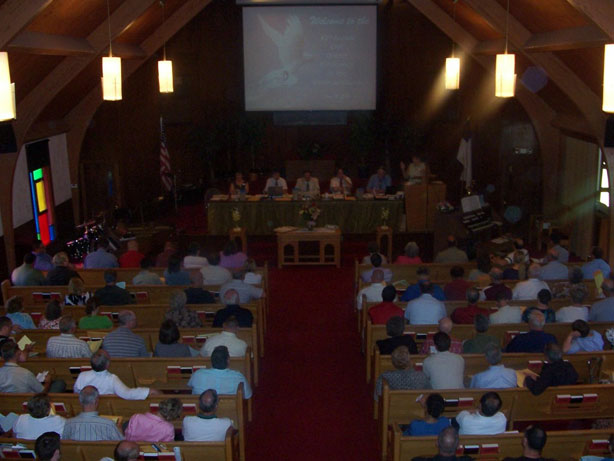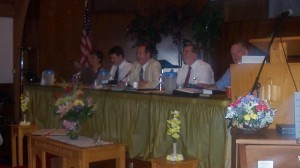 I’ve been noticing lately how much I treasure the quiet places in my life. Recently when I visited my daughter and son-in-law, I found a quiet spot on their front porch to enjoy a cup of tea, watch the mockingbirds chase away a crow; to pray, reflect in silence and just enjoy the moment. At home, I like to awaken earlier than my wife and sit in my recliner near the front window– my reading corner– and have my morning devotions. I’m writing this in a cabin at Chambers Camp at the annual Family Camp, a get-away, I have enjoyed for many years. Sometimes a quiet spot is simply an activity that takes significantly less concentration and allows the mind to wander, to catch its breath, to bring to consciousness its subterranean work. For me, that could be working in the garden, or walking for exercise. Even just stopping for a few moments to enjoy an exquisite garden blossom can provide a mini-respite from the hubbub of the day. But some rest times need to be more extended; a prayer retreat overnight at an inexpensive hotel, a half-day of reflection and prayer at a local park, a time at a Christian family camp like Chambers. These Sabbath moments filled with quiet renew our mind somehow.
I’ve been noticing lately how much I treasure the quiet places in my life. Recently when I visited my daughter and son-in-law, I found a quiet spot on their front porch to enjoy a cup of tea, watch the mockingbirds chase away a crow; to pray, reflect in silence and just enjoy the moment. At home, I like to awaken earlier than my wife and sit in my recliner near the front window– my reading corner– and have my morning devotions. I’m writing this in a cabin at Chambers Camp at the annual Family Camp, a get-away, I have enjoyed for many years. Sometimes a quiet spot is simply an activity that takes significantly less concentration and allows the mind to wander, to catch its breath, to bring to consciousness its subterranean work. For me, that could be working in the garden, or walking for exercise. Even just stopping for a few moments to enjoy an exquisite garden blossom can provide a mini-respite from the hubbub of the day. But some rest times need to be more extended; a prayer retreat overnight at an inexpensive hotel, a half-day of reflection and prayer at a local park, a time at a Christian family camp like Chambers. These Sabbath moments filled with quiet renew our mind somehow.
There’s a verse of Scripture that says, “In quietness and in trust shall be your strength” (Isa 30:15 ESV). God knew we would need to stop the hubris in our lives and allow ourselves process time. I’ve found that such times are also some of my most creative times as well. When I try to keep working without them, I find myself advancing only by shear persistence and wearing down in the process. In addition, I notice that I come up with few new ideas and creative solutions during such times. But in those quiet moments, God can speak to me. Maybe that’s when I am listening better.
Jesus found the need for quiet times in his life too. After the feeding of the crowd, he went up on the mountainside alone to pray (Mark 6:46). Before choosing his disciples, he prayed alone in the night on the mountainside (Luke 6:12). Of course, we think of his time of prayer in the Garden of Gethsemane.
In the Old Testament, national feast times may have provided a structure for such breaks. One, the Feast of Tabernacles (Booths) was a week in length (Lev. 23:34).
I remember reading about this concept in Ron Hutchcraft’s Peaceful Living in Stressful Times, “Regular rest and recovery is not an option in God’s plan. There is a price to pay for neglecting it (p. 55).
Some quiet times need to be pretty much institutions in our lives; Sabbath, daily devotions, annual vacation to suggest some. But many of the most effective reflective interludes will be found along the path as we deliberately look for and take advantage of moments of quiet. Perhaps it is a stop along the highway at a beautiful overlook, a short rest in a garden nook amid late June blossoms; a cup of tea or coffee in front of a quiet window, a long shower or soak in the tub, a walk—well, you fill in your own list.
I am convinced that these quiet moments of life are essential. During these times we:
• Have a mini-rest from the drivenness, constant activity, and incessant data input of our culture. This resets our chemistry from abnormal adrenaline-pumping to a more normal pace.
• Integrate and process our reality, an essential part of healthy coping. We really can’t process well on the go.
• Generate most of our creative ideas and problem solutions. A great inventive genius like Edison was reported to have kept a couch in his office for the purpose of taking a break.
• Reflect on our own actions, allowing us to step back and admit when we are wrong or change our relationship strategy to better relate to a friend.
• Pray most effectively. We have a time to talk ourselves out and then listen to God. And during such times we are more willing to listen. We might even practice being open to hear God’s still small voice. I’ve found it takes time to get me to be quiet before God.
• Renew our zest for life and work. Quiet times are truly re-creative. They restore energy and zeal.


